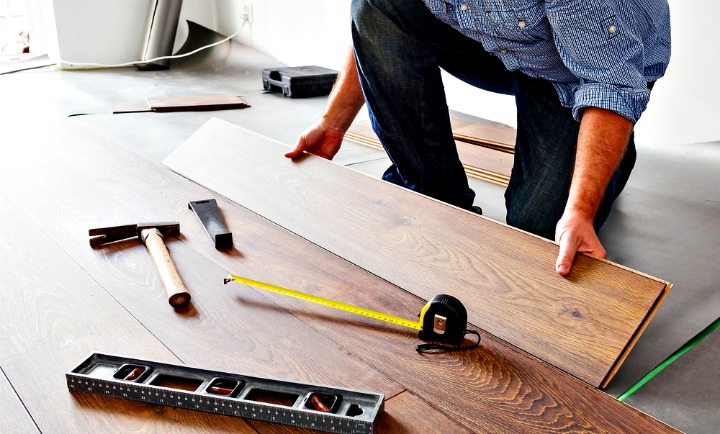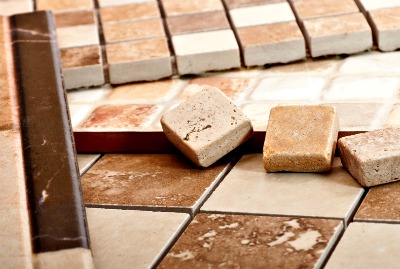Do Flooring Contractors Need Insurance?

You’ve worked hard to build up your flooring-installation business. But what if one of your employees is seriously injured while installing hardwood flooring in a home in a remote location? What if the chemicals that you use while installing flooring make your clients sick? And what if while tearing out an existing floor, your flooring contractor cause serious damage to a home?
Can your business survive a costly lawsuit?
It can if you have paid for the property insurance coverage.
Having the right insurance will protect flooring contractors from costly lawsuits and legal actions that could otherwise force them into bankruptcy protection or cause them to shutter their businesses entirely.
The challenge? It’s not always easy for contractors working in the flooring business to understand what type of insurance protection they need. Flooring contractors can’t get by with just a typical general liability insurance policy. Instead, they need to take out a package of different policies that will protect them from the many problems that can arise in such a labor-heavy business.
Commercial general liability policy
The first insurance coverage in which flooring contractors need to invest is a commercial general liability policy. This type of policy provides financial protection to business owners if clients or visitors to a work site suffer bodily injuries. It also provides contractors financial protection in case they cause property damage while working on a job site.
Say a flooring contractor is working in a residential home and leaves dangerous or sharp equipment lying out. If a resident of the home suffers a cut and needs medical attention, the contractor’s general liability coverage will help cover any medical treatment the resident requires. The policy will also help pay for the costs contractors incur when defending themselves against any lawsuit that might result from such an injury.
RELATED: Does Your Congregation Need Church Insurance?
Or maybe a flooring contractor accidentally breaks a pipe while installing a new kitchen floor. If that pipe sprays enough water to cause serious damage, the general liability policy will help pay for the costs of repairing this damage. Again, it will also cover the costs that a flooring contractor might incur when defending against a lawsuit resulting from this damage.
Sam Williamson, a contractor and installer with Floor Heating Direct, said that insurance that protects his company from injuries that customers, clients and visitors suffer is essential. Floor Heating Direct is a large flooring specialist and runs its own showroom. That makes the protection offered by insurance even more important, he said.
“It helps us if someone gets injured at our showroom, which is important as we have flooring on display,” Williamson says. “It also protect us if an accident occurs due to one of our products. We do deal in heating, which always has the potential to cause an accident.”
 There could be a serious hole, though, in the commercial general liability coverage that some flooring contractors purchase. There might be an exclusion in coverage relating to pollution that could leave contractors with a serious financial hit.
There could be a serious hole, though, in the commercial general liability coverage that some flooring contractors purchase. There might be an exclusion in coverage relating to pollution that could leave contractors with a serious financial hit.
Flooring contractors might not think that they deal with pollutants. But what about the sealant that they use when installing a new floor? And what if a flooring contractor is working in a restaurant or grocery store?
“The fumes from flooring material being applied by a contract can damage food products stored on site,” says Ben Guttman, insurance consultant and broker with Heller Kowitz Insurance Advisors in Lutherville, Maryland. “They can be sued for that.”
Contractors, then, need to make sure that pollution coverage is either not limited or excluded from their general liability coverage. If it is, the owners of whatever property these contractors are working in could file a costly lawsuit against them.
“They need to make sure that limited or complete exclusion of pollution coverage does not come back to haunt them,” Guttman says.
Workers’ compensation matters, too
Commercial general liability, as important as it is, doesn’t provide all the protection that flooring contractors need.
That’s because it only covers clients, guests to a work site and other visitors. It doesn’t provide any coverage if a contractor’s employees suffer an injury while on the job. Flooring contractors who employ workers, then, need to also invest in workers’ compensation insurance.
Workers’ compensation insurance covers any legal or medical costs that their employees suffer while on the job. Say a worker inhales toxic sealant fumes while installing a floor in a home. If that worker needs medical attention, the contractor’s workers’ compensation insurance will help pay for treatment.
Commercial property insurance
Commercial property insurance can be an important coverage for flooring contractors who operate their own showrooms. This type of insurance will coverage any damages to a shop or other facility owned by a flooring contractor.
What would happen to floor contractors whose showrooms are destroyed in a fire? Would they be able to cover the costs of rebuilding? Would they be able to handle the expenses of replacing whatever equipment and flooring materials were destroyed along with the building?
RELATED: What Is BOP Insurance?
A commercial property insurance policy will cover all or much of the costs of rebuilding a damaged or destroyed shop. It will also help contractors cover the costs of replacing damaged, destroyed or even stolen materials from their shops or other business locations.
Flooring contractors might also consider investing in what is known as inland marine insurance. This insurance with a somewhat confusing name provides protection for any equipment or materials owned by flooring contractors that they are moving from one location to another.
This insurance can be important for flooring contractors who might rely on expensive tools. If these tools are damaged or destroyed, inland marine insurance will cover the costs of either repairing this equipment or replacing it.
Flooring contractors might also invest in commercial auto insurance. This insurance provides a payout to contractors whose vehicles are damaged or destroyed while on the job. Again, this insurance might be a prudent investment. Vehicles are not inexpensive. A relatively inexpensive commercial auto policy can help contractors replace damaged or destroyed cars or trucks without having to spend the big dollars necessary if they didn’t have coverage.
How much flooring contractors will have to pay for insurance varies on how big the contractor’s business is, whether they employ workers and how much equipment they need to insure.
Benjamin Palancia, owner of Albert Palancia Agency in Mamaroneck, New York, says that a small flooring contractor, maybe one who runs a one-person shop, can expect to pay about $1,000 a year for commercial general liability insurance and maybe $1,500 for commercial property insurance. Those numbers, though, would rise for flooring contractors with larger staffs, showrooms and commercial vehicles.
